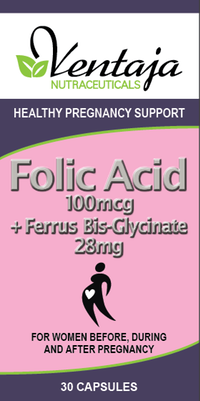
Folic Acid and Pregnancy
Folic Acid is a pregnancy superhero! Taking a prenatal vitamin with folic acid before and during pregnancy can help prevent birth defects of your baby's brain and spinal cord.
What Is Folic Acid?
Folic acid, which is also called folate, is a B vitamin. The best food sources of folic acid are fortified cereals. Folic acid plays an important role in the production of red blood cells and helps your baby's neural tube develop into her brain and spinal cord.
When Should I Start Taking Folic Acid?
Birth defects occur within the first 3-4 weeks of pregnancy. So it's important to have folic acid in your system during those early stages when your baby's brain and spinal cord are developing.
If you talked to your doctor when you were trying to conceive, she probably told you to start taking a prenatal vitamin with folic acid. One study showed that women who took folic acid for at least a year before getting pregnant cut their chances of delivering early by 50% or more.
Ferrus Bis-Glycinate and Pregnancy
A study published in the Journal of Perinatal Medicine shows that a low dose of ferrous bisglycinate (Aminojern, a product containing Albion’s Ferrochel) may be equivalent to a higher dose of ferrous salt with regard to hematological and iron status when used by expectant women. This finding is important for the prevention of iron deficiency and iron deficiency anemia that often coincides with pregnancy.

One of the greatest challenges for pregnant women is maintaining adequate iron levels from conception and throughout gestation. Iron is critical for maintaining a woman’s red iron cell stores and to properly support development of a fetus. With the bioavailability of different iron forms varying so greatly and the preference for lower dose iron supplementation gaining acceptance, the researchers sought a comparison of different iron forms and doses.
In this peer-reviewed study, ferrous bisglycinate was taken by 80 Danish pregnant women throughout their pregnancy with measurements taken at 15–19, 27–29, and 36–37 weeks. Women were assigned to either a group that took a 25 mg dose of a ferrous bisglycinate elemental iron per day or a control group using a 50 mg dose of ferrous sulfate elemental iron per day for the designated time period.
The researchers found that participants who received the low dose ferrous bisglycinate benefitted equally to that of the control group with less gastrointestinal complaints. In addition, the newborn weight for the ferrous bisglycinate group was slightly higher than the control group.
Conclusions from the study suggest that adequate prevention of iron deficiency or iron deficiency anemia can be achieved using a low dose of ferrous iron from 15–19 weeks of gestation with appreciable side effects such as lower gastrointestinal distress and healthier baby birth weights. These findings are very important in women with a preference or greater tolerance for a lower dose of iron.
